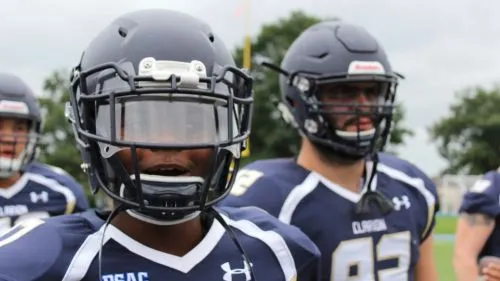Being present in sports means you are in the here and now. Your mind isn’t traveling to the future, full of worries about what may or may not happen. It isn’t thinking about the past and getting caught up in bad games or practices you’ve had recently.
No, when you are present, you are fully focused on what you are doing.
Sounds like a great state to be in as an athlete, don’t you think?
Absolutely!
In this article, I’m going to explain why being present in sports is so important, along with two powerful tips you can use to compete with a more present mindset.
Timeline of Thinking
The other day on a 1-1 coaching call, I drew a timeline to illustrate the importance of being present. Admittedly, it was a terrible drawing, but either way, it helped to visualize the idea of our thinking being able to live in three different planes.
Here is the image below recreated so that it’s a bit cleaner.
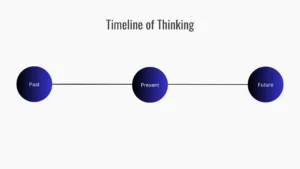
In the middle of the timeline is the present, to the right is the future, and to the left is the past.
Whenever we are talking about competing in the present moment, we are talking about your attention. You want your mind completely centered in the here and now.
The reason has to do with the benefits of being present, but also the negative impact allowing your mind to travel into the past or future has on your game.
It doesn’t mean that every time you think about the future or the past it’s a bad thing. What matters is what you are thinking about in the past or future, and the way you are thinking about it.
Take this second image for example. In it you see your attention having drifted into the past.
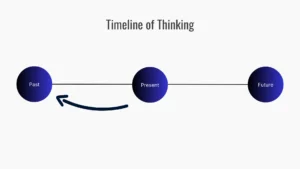
Now, if you are thinking about the past to try and learn from it and then your attention moves back into the present, that’s positive.
However, if your mind remains in the past, and you think about a past bad game or how you haven’t done too well in practice recently, this will hurt your game.
Now, let’s take a look at another image that has your attention in the future.
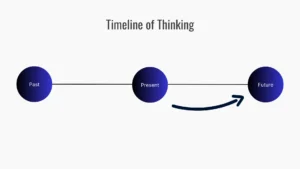
If you’re thinking about the future (your next game, let’s say) and going over a game plan or getting excited for the game, that can be helpful. As long as your attention once more returns to the present by game time.
If your mind remains in the future, this is where we see anxiety develop due to worries about what may or may not happen in the game.
But our minds do not work in such a set way. We experience a lot of bouncing around with our attention.
Take this fourth image, as an example.
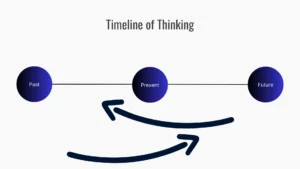
When your mind is in the past, thinking about some bad games, it’s natural to then spring into the future and start to worry. With those worries, you may then think of another bad game, and once more find yourself in the past.
Then, once more your attention shoots to the future.
This back and forth increases fear and anxiety, causes you to play tense and timidly, and keeps you from performing your best.
If, however, your mind remains more in the present, the picture looks a lot different.
Benefits of Being Present in Sports
When you’re able to keep your attention centered in the present moment, your play will improve. This is why one of the most elusive, but sought after states in sports – the flow state – is characterized by being present.
When you’re present, you perform at peak levels.
The reason for this increase in performance is due to the four main benefits of being present when you compete.
Reduced Fear & Anxiety
In the previous section we examined a few different images that illustrated what happens when your mind travels into the past and future, and the fear and anxiety that follow.
Anxiety and fear cannot survive in a mind that is centered in the present. Both states are dependent upon past and future thinking.
When your mind is present, you don’t worry about the future as much. In fact, you can’t. If you do, by its very definition you are not present.
The same is true with the past. When you’re focusing on the present, you cannot be thinking about past mistakes and poor games you’ve had recently.
Playing with less anxiety and fear is a game changer. Leading to almost immediate increases in performance, simply due to no longer playing scared, tight, and timidly.
Stronger Focus
Naturally, focus will improve when you are more present. Mainly because you need stronger focus in order to be more present.
The two are one in the same.
Being present is all about attention. Your body is always in the present, but the mind rarely is.
It’s easy for us to think about what will happen in the future, what happened last play, and so on. The difficulty comes into play when you want to stop such thinking and instead keep your mind in the present.
That requires a tremendous amount of focus and strength over your thinking.
As a byproduct of being more present, your focus will increase in all areas of your game.
You will give more attention to training and you will focus better during competition.
Increased Confidence
Building confidence in sports is difficult. Especially if you struggle with a lot of negative self-talk or doubt.
But you need confidence. Without trust in yourself and your skills, you will hold yourself back and never reach your true potential.
What’s most interesting about confidence is that a lot of times we have more confidence than we think…it’s just being blocked.
But what’s causing the block?
A mind not in the present.
Every time you worry about what might happen in the game or beat yourself up over a past mistake, you cover up your confidence a little more.
You are stripping away the belief and trust you have in yourself and your skills by thinking too much about the past or future.
A mind centered in the present moment eliminates this fear and anxiety, freeing your mind to experience the confidence that’s already there.
Plus, being present increases performance. And nothing builds confidence as much as playing well.
Playing Freely
The final benefit of being present when you play is competing freely. No longer holding yourself back because of fear or worry.
Think back to your most recent good game. Would you say you were playing tight and holding yourself back?
I doubt it.
There’s not a high chance of your best games also being the games where you were tight, timid, and holding yourself back. But that’s exactly how you’ll play if your mind is too much in the past or future.
Being present strips away that fear and anxiety and allows you to play freely.
So would you say you were playing freely and just in the moment during your most recent good game?
That’s what I would bet on.
One common characteristic between all the explanations I get from athletes when describing their best performances is that they were playing freely.
They let go and just played.
When you are present, you will find yourself playing freely. And playing freely is where you allow your true talents to take over.
Two Tips to Be More Present
Playing with a present focused mindset is key to peak performance.
Unfortunately, it’s not always the easiest mindset to have.
Many distractions will pull your attention along that timeline into the past or future. It is your job to work to keep your mind centered in the present.
And there are two tips you can use to help: train the state of being present and give yourself something to focus on.
Training the State of Being Present
When there is a skill within your game you need to improve, what do you do?
Do you hope it gets better? Or, do you identify what drills or exercises would build the skill and then focus on consistent repetition?
The second option is where true improvement is found. And it’s also the same exact approach we’re going to take to building the skill of being present.
Because being present is a skill. One of the most important skills, in fact, for you as an athlete to develop.
So what does it mean to train the skill of being present?
It means two things: training the ability to hold your attention in the present moment and training the ability to notice your attention drifting and refocusing it quickly.
An easy way to understand this idea is to imagine I asked you to hold a pen at arms length and stare at the tip of the pen. Keeping your eyes fixed on the pen is analogous with being present.
You want to train how long you can stay locked onto that pen.
Naturally, though, your eyes will drift. You’ll look at the wall, something else in the room, or maybe a person walking by.
The other aspect of training focus is learning how to realize, as quickly as possible, you’ve stopped looking at the tip of the pen and redirect your focus.
Now, staring at a pen can be quite the strain on the eyes. So that’s not the exercise we’re going to use.
Instead, we’re using a technique called mindfulness meditation to train your ability to remain present.
Mindfulness is the state of being completely present in the moment. It is the state we have been discussing in this article. Mindfulness meditation is the practice of training that state each day.
To train your ability to be present through mindfulness meditation, you must perform the exercise consistently. Just like any other drill or tool you use to train, it will only have a strong effect if used repetitively.
Here is how to practice mindfulness meditation:
- Get into a comfortable seated position with your back straight.
- Set yourself a timer for five minutes.
- Close your eyes and begin taking nice, deep breaths.
- Focus your attention on your breathing.
- When you begin to think about anything other than your breathing, notice that and then return your focus onto your breath.
- Repeat this process over and over, continuing to try and focus on your breath, until time is up.
I recommend beginning with five minutes, and then slowly increasing the amount of time you practice mindfulness meditation. Ultimately the goal is to get to twenty minutes a day.
One thing I do want to mention is that the goal of practicing mindfulness meditation is not to have no thoughts, a blank mind, or to be perfect with focusing on your breath.
The goal is simply to try and focus on your breathing and refocus whenever you notice your attention drifting.
Over time, as you stay consistent with your practice, you will improve in your ability to focus on your breath. Meaning, you will improve in your ability to be present.
Giving Yourself Something to Focus On
The second tip involves a tool you can use to stay focused in the present during practices and games.
Did you notice how with mindfulness meditation you are trying to focus on your breath? How come I didn’t say to just focus on being present?
Because being present is a vague and intangible idea. But if I say, focus on the feeling of your breath going in and out, that gives you something more concrete to focus on.
Since your breathing is taking place in the present moment, by focusing on it, you will be present.
That is the same principle we are using when it comes to being more present during practices and games.
If you simply try to focus on being present without knowing what you actually need to focus on to do so, it’s too easy for the past and future to yank your attention out of the here and now.
So, what should you focus on?
To be honest, it doesn’t matter as long as it is controllable and part of the process of your game.
You want to choose simple objectives or cues to focus on during practices and games that keep you focused on what’s happening right now.
And you can have a few different objectives within a given game. However, you can only focus on one at a time.
For example, a baseball player will have different objectives for different parts of the game.
When he is hitting, he may have the objective of focusing on the ball. In the field it may be to want the ball. And in the dugout it may be to watch the pitcher or to cheer on his teammates.
For yourself, select objectives that are part of the process of your game and 100% within your control. Then use them to keep your attention centered in the present moment.
Final Thoughts
Being present leads to peak performance.
When your mind is in the past or the future, this drives fear, anxiety, and many other hurtful patterns of thinking that do nothing but cause you to underperform.
When you are present, you play freely and with confidence.
But being present when you play isn’t always the easiest thing to do. Which is why it needs to be trained.
You want to use mindfulness meditation to train the skill of being present, and use performance objectives to give yourself something concrete to focus on during practices and games.
By applying these two tips, you will help yourself compete with a present mindset, unlocking your true potential. Thank you for reading and I wish you the best of success in all that you do.

